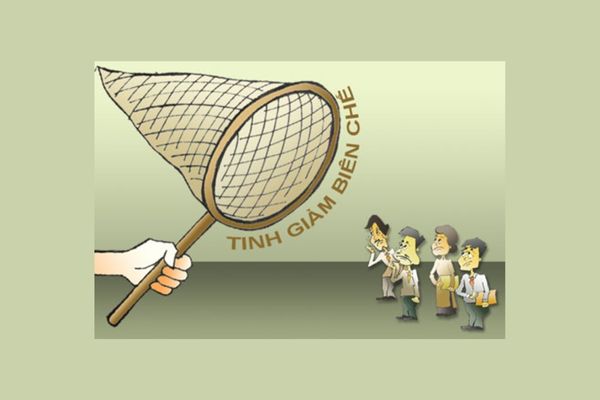Which Subjects Are Eligible for Streamlined Payroll According to the Latest Proposal from the Ministry of Home Affairs?
Which subjects fall under the scope of the latest staff streamlining proposal by the Ministry of Home Affairs?
Based on the content of the Draft Decree on staff streamlining replacing Decree 108/2014/ND-CP, Decree 113/2018/ND-CP, and Decree 143/2020/ND-CP (referred to as the "Draft Decree").
Article 4 of the Draft Decree on staff streamlining proposes the following subjects for staff streamlining:
- officials and public employees and commune-level officials
- Individuals who have been officials and public employees rotated by competent authorities to hold key positions at unions assigned by the Communist Party or the State tasks
- Individuals who are officials assigned by competent authorities to participate in the management or act as authorized representatives of state capital in state-funded enterprises.
Compared to the current legislation, the Draft Decree on staff streamlining has eliminated 03 inapplicable subjects as follows:
| No. | Streamlining Subject || --- | --- || 1 | Contractual employees:
- Persons working under indefinite-term labor contracts in administrative agencies, public service providers not yet fully autonomous in task execution, finance, organizational structure, and personnel.
- Personnel, persons working under indefinite-term labor contracts in fully autonomous public service providers. || 2 | Chairman of the company, members of the Members' Council, General Director, Deputy General Director, Director, Deputy Director, Chief Accountant, controllers in single-member limited liability companies owned by the State or political organizations, socio-political organizations (not including General Director, Deputy General Director, Chief Accountant working under labor contracts). || 3 | Individuals working in positions assigned by state agencies to unions. |

Which subjects fall under the scope of the latest staff streamlining proposal by the Ministry of Home Affairs? (Image from the Internet)
How many contents are included in the Draft Decree on staff streamlining?
According to the Draft Presentation on the Draft Decree replacing Decree 108/2014/ND-CP, Decree 113/2018/ND-CP, and Decree 143/2020/ND-CP (referred to as the "Draft Presentation"). The Draft Decree on staff streamlining includes 5 Chapters and 24 Articles. Specifically:
| Chapter | Content || --- | --- || Chapter I | General Provisions (from Article 1 to Article 5) || Chapter II | Provisions on staff streamlining policies (from Article 6 to Article 12) || Chapter III | Provisions on procedures and deadlines for resolving staff streamlining (from Article 13 to Article 15) || Chapter IV | Provisions on the responsibilities of agencies and units in implementing staff streamlining (from Article 16 to Article 22) || Chapter V | Provisions on enforcement clauses (Article 23 and Article 24). |
What is the current procedure for staff streamlining?
The procedure for implementing staff streamlining is regulated in Article 14 of Decree 108/2014/ND-CP, as amended by Clause 6, Article 1 of Decree 143/2020/ND-CP and Clause 11, Article 1 of Decree 113/2018/ND-CP.
Specifically, with the following steps:
Step 1: The head of the agency, organization, or unit is responsible for cooperating with the party committee, trade union organization, and socio-political organizations at the same level to implement the staff streamlining policy as follows:
- Propagate, disseminate, and thoroughly grasp the staff streamlining policy stipulated in this Decree to officials, public employees, and workers under their management.
- Develop the staff streamlining plan of their agency or unit according to the prescribed procedures and submit it to the competent authority for approval.
- Prepare a list and estimate the reduction allowance for each subject of staff streamlining twice a year (every 6 months) and submit it to the competent authority for approval based on the approved staff streamlining plan;
Step 2: Ministries, ministry-level agencies, government-affiliated agencies, organizations established by the Government or the Prime Minister that are not public service providers, provincial and municipal People's Committees:
- Guide affiliated and subordinate agencies, organizations, and units to implement this Decree;
- Approve the staff streamlining plan of affiliated and subordinate agencies, organizations, and units;
- Approve the list of subjects of staff streamlining and use the annual regular budget expenditure to pay policies for subjects of staff streamlining.
- Twice a year (every 6 months), compile the results of staff streamlining, including the list of subjects of staff streamlining (with explanations clarifying the reasons for streamlining each subject) and the funding for staff streamlining of their ministries, sectors, and localities to the Ministry of Home Affairs and the Ministry of Finance for inspection according to regulations.
Step 3: The Ministry of Home Affairs shall inspect the subjects of staff streamlining based on the staff streamlining results reported by the ministries, sectors, and localities and give feedback to the Ministry of Finance as a basis for checking and finalizing the funding for staff streamlining.
Step 4: Based on the feedback from the Ministry of Home Affairs, the Ministry of Finance shall inspect the calculation of policies and funding for staff streamlining of the ministries, sectors, and localities to handle the funding according to regulations.
Step 5: The agency or unit directly managing officials and public employees shall pay the policies for each subject of staff streamlining.
LawNet